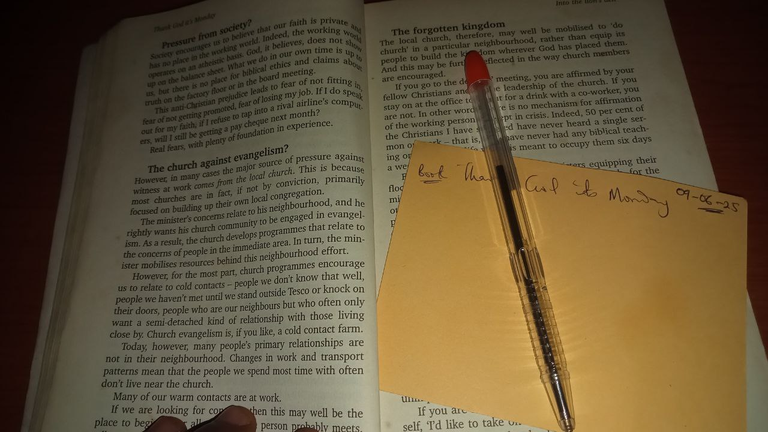Thank God It’s Monday: Review & lessons from Mark Greene's charge on ministry in the Workplace

For many people, Monday is the least favourite day of the week. This is because it marks the end of the weekend's rest as well as the beginning of stress, toward the slow climb back to Friday. But as a pastor, Monday feels very different to me. After an intense weekend of preaching, counseling, teaching, coordinating services, and shepherding God’s people, Monday is my Sabbath in motion. I mean a chance to breathe, reflect, and see the beauty of what God is doing beyond the church building.
Today, on my reading schedule was Mark Greene’s Thank God It’s Monday. While reading the book, I found insight for something I’ve always sensed: the church is not just what happens on Sunday, but what the people of God live out on Monday. And as someone whose ministry peaks on the weekend, I’m learning to celebrate and commission the Monday mission of the people I serve. I've had this book on my shelf for many years and had covered it, but I needed a fresh drink, which I had after covering the first two chapters earlier today.

About the Book
Thank God It’s Monday is one of Mark Greene’s finest writings. What caught my interest when I first bought the book was that I had known the popular "Thank God it's Friday" said by many after a long work-filled week. I wasn't yet a Pastor then, but I wanted to learn from the writer's differing narrative to work, weekdays and weekends. The copy I own is the Third edition, reprinted in 2004. The 180-page book contains 16 chapters loaded with stories and lessons targeted at "ministry in the workplace".
My Reviews and Lessons
In the first chapter "Into the Lion’s Den", Greene posited clearly that "the workplace is God's place of opportunity and a place to express the compassion of the gospel in word and deed". That was heavy. The author further reminded us that all vocations are equal and that many of the biblical heroes were what we term "secular" workers. People like Lydia, the merchant (Acts 16: 14-15), Nehemiah, the security agent (Neh 4: 12-15), Joseph, the chancellor (Genesis 41: 41), among others, were ordinary men and women working out their faith in their workplaces.
The man Daniel, who worked as an imperial adviser (Dan 2: 48), not a preacher, was a faithful public servant in a hostile work culture. Daniel’s integrity, excellence, and unshakable faith made an impact in a place many would consider spiritually barren. That resonated deeply with me as a pastor. I'm reminded that while I shepherd people in the “safe space” of church gatherings, I should also be aware that they are entering their lion’s dens on Monday: boardrooms, hospitals, classrooms, and construction sites, etc. And just like Daniel, they are not meant to survive there but shine there. The underlying truth here is that all work needs to be done in line with the word of God and to his glory.
But here's the truth: God does not divide sacred from secular. He redeems it all. Your work carries eternal significance when done as unto the Lord, whether you are designing software, baking bread, or driving a cab.

In Chapter Two "Another Day, Another Dime?", Greene explains creation as the "work of God" and emphasizes that God started work. Thus, he challenges the mundane view of work as simply earning a living and calls for a shift from making money to making meaning. The unique exposition on "time" in this chapter reveals God as the Lord of time and time as God's gift to us. Knowing this would keep one conscious of putting every second, minute, hour, and day into profitable use.
I've also learnt that our popular complain that "time is not enough" is a temptation to work without a conscious allowance for rest, which is part of the work cycle. The message in this chapter is also a challenge to the mindset of work in our age, which is tied to "economic terms". That is, we see work as what we are paid to do. However, the truth is that work constitutes the activities we engage in during the week, whether at home, employed, or unemployed.
Why I Thank God for Monday
I thank God for Monday because it is the true test and testimony of Sunday’s message. I thank God for Monday because it is when the church leaves the building and enters the boardroom, the classroom, the kitchen, the street.
As a pastor, my weekend peaks to launch others into their weekday purpose. Monday is not a return to the grind; it is a return to the garden, where God first commissioned humanity to work, create, cultivate, and rule in His image.
Finally, I thank God it’s Monday, not because I get to rest, but because people who were taught God's word get to work and in doing so, worship God.
To every believer, your Monday is just as much a ministry as a pastor's Sunday.
All images are taken by me

If you found the article interesting or helpful, please hit the upvote button, and share for visibility to other hive friends to see. More importantly, drop a comment beneath. Thank you!
Let's Connect
Hive: https://inleo.io/profile/uyobong/blog
Twitter: https://twitter.com/Uyobong3
Discord: uyobong#5966
Posted Using INLEO